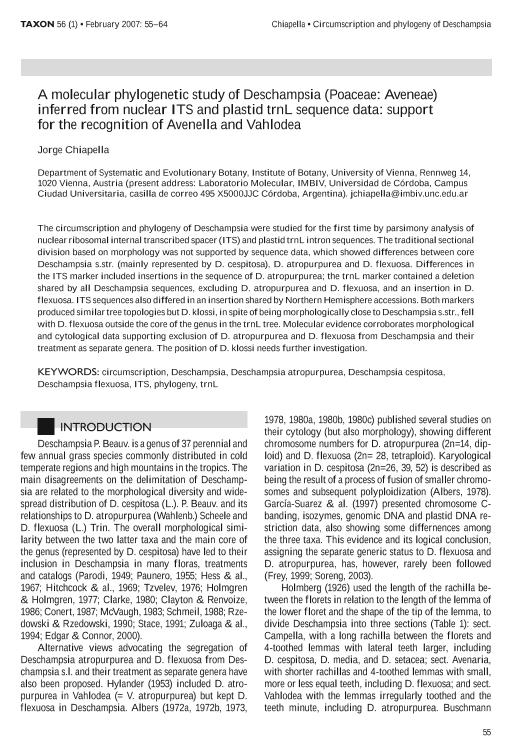Artículo
A molecular phylogenetic study of Deschampsia (Poaceae: Aveneae) inferred from nuclear ITS and plastid trnL sequence data: support for the recognition of Avenella and Vahlodea
Fecha de publicación:
02/2007
Editorial:
International Association for Plant Taxonomy
Revista:
Taxon
ISSN:
0040-0262
Idioma:
Inglés
Tipo de recurso:
Artículo publicado
Clasificación temática:
Resumen
The circumscription and phylogeny of Deschampsia were studied for the first time by parsimony analysis of nuclear ribosomal internal transcribed spacer (ITS) and plastid trnL intron sequences. The traditional sectional division based on morphology was not supported by sequence data, which showed differences between core
Deschampsia s.str. (mainly represented by D. cespitosa), D. atropurpurea and D. flexuosa. Differences in the ITS marker included insertions in the sequence of D. atropurpurea; the trnL marker contained a deletion shared by all Deschampsia sequences, excluding D. atropurpurea and D. flexuosa, and an insertion in D.
flexuosa. ITS sequences also differed in an insertion shared by Northern Hemisphere accessions. Both markers produced similar tree topologies but D. klossi, in spite of being morphologically close to Deschampsia s.str., fell with D. flexuosa outside the core of the genus in the trnL tree. Molecular evidence corroborates morphological and cytological data supporting exclusion of D. atropurpurea and D. flexuosa from Deschampsia and their treatment as separate genera. The position of D. klossi needs further investigation.
Palabras clave:
Phylogeny
,
Molecular
,
Deschampsia
Archivos asociados
Licencia
Identificadores
Colecciones
Articulos(IMBIV)
Articulos de INST.MULTIDISCIPL.DE BIOLOGIA VEGETAL (P)
Articulos de INST.MULTIDISCIPL.DE BIOLOGIA VEGETAL (P)
Citación
A molecular phylogenetic study of Deschampsia (Poaceae: Aveneae) inferred from nuclear ITS and plastid trnL sequence data: support for the recognition of Avenella and Vahlodea; International Association for Plant Taxonomy; Taxon; 56; 1; 2-2007; 55-64
Compartir




